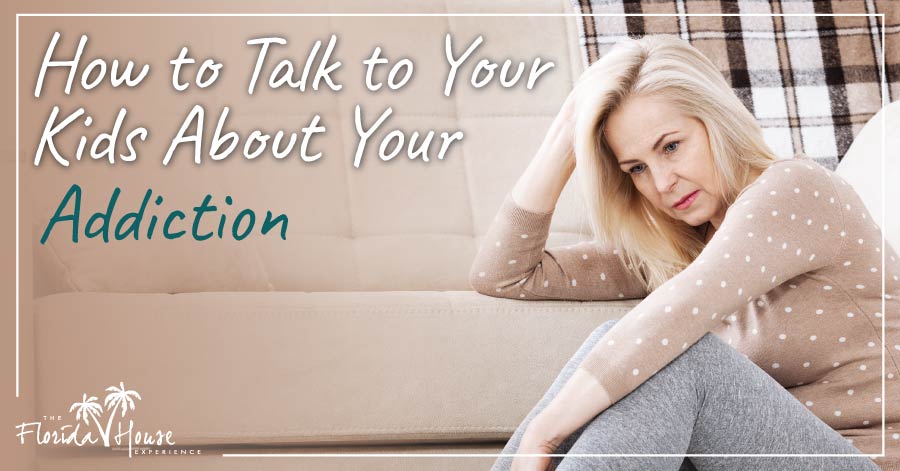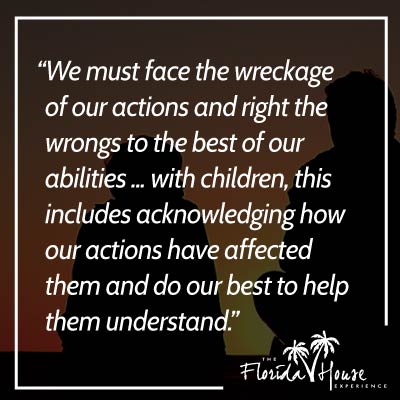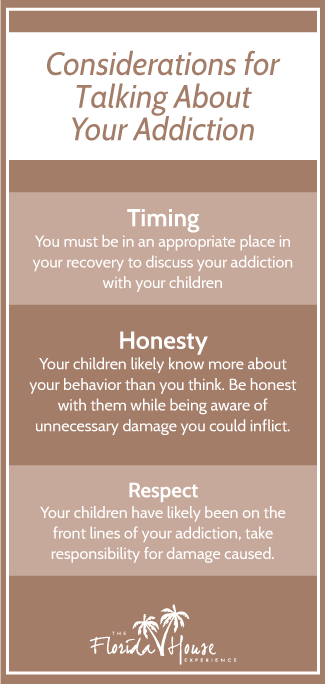
At a certain point in everyone’s journey to recovery, we must face the wreckage of our actions and right the wrongs to the best of our abilities. If you have children, this includes acknowledging how our actions have affected them and do our best to help them understand what’s been going on and how you intend on making the situation better.
 If you’re actively struggling with addiction, there’s a good chance your family members are aware and affected by your behavior. With the whirlwind you’ve brought into the home, the question becomes at what point do you openly discuss your addiction with your family – particularly your children. There is no easy answer to this question, but in our experience, the three most important factors to consider are honesty, respect, and timing. Children are incredibly perceptive, even at a young age. It is essential to address these issues head-on instead of putting it off expecting them to work out on their own. The fact that you are looking for help regarding this subject is a great sign that you are doing the right thing for your children. They need a parent who is not uncomfortable talking about these issues, especially if they have witnessed it in their behavior throughout their life. While it may seem awkward or unusual to cover this topic with kids, it is absolutely imperative that they hear from an adult they respect.
If you’re actively struggling with addiction, there’s a good chance your family members are aware and affected by your behavior. With the whirlwind you’ve brought into the home, the question becomes at what point do you openly discuss your addiction with your family – particularly your children. There is no easy answer to this question, but in our experience, the three most important factors to consider are honesty, respect, and timing. Children are incredibly perceptive, even at a young age. It is essential to address these issues head-on instead of putting it off expecting them to work out on their own. The fact that you are looking for help regarding this subject is a great sign that you are doing the right thing for your children. They need a parent who is not uncomfortable talking about these issues, especially if they have witnessed it in their behavior throughout their life. While it may seem awkward or unusual to cover this topic with kids, it is absolutely imperative that they hear from an adult they respect.
Discussing Your Addiction with Your Kids
When you’re living with active addiction you’re not yourself. It can be hard to identify how your actions impact those around you but rest assured everyone is well aware of what’s going on. You might be entirely wrapped up in yourself and the daily activities involved with actively managing your habit, but your children are well in tune with what is happening around them. So how do you navigate through your addiction with your kids?
 Timing – Timing is critical when talking to your kids about addiction. There is no value in explaining to your children that you are an alcoholic while you have a drink in your hand. The best way to navigate this very important step is to first get your ducks in order. Ask for help from your spouse or significant other to get into a program to find your treatment options and begin working on your addiction recovery first. In doing so you will enter the recovery process that will enable you to clear your mind and meet with experienced professionals that can serve to guide you in this difficult process, and in many cases, help mediate the conversation. If you are in a good place in your recovery, then it is imperative to talk to your kids about it. While there is no “perfect timing,” it is still important to find time to have the conversation. Many parents simply feel uncomfortable, awkward or use the excuse their child isn’t old enough to understand in order to justify putting off the talk about alcohol abuse or addiction. Keep in mind that substance abuse is common in kids as young as 12 years old. Even years younger than 12 they are mature enough to understand what alcohol and drugs are and perceptive enough to know if you aren’t telling them all the facts. Most kids will not approach their parents about this topic, so it is vital that the parents initiate the conversation. If you don’t initiate the conversation early on, they will get all their information from other kids and from the internet which is frequently inaccurate. Kids need to hear a perspective and point of view from an adult they trust so that they have some background when put in situations surround drugs and alcohol. Additionally, this is not a topic to be sprung on them at will. It’s important to prepare for the conversation as opposed to openly bringing it up over dinner. Remember, it’s not about you, this is about helping them navigate the pain they’ve endured while you’ve been inactive addiction to help them recover and support you as well.
Timing – Timing is critical when talking to your kids about addiction. There is no value in explaining to your children that you are an alcoholic while you have a drink in your hand. The best way to navigate this very important step is to first get your ducks in order. Ask for help from your spouse or significant other to get into a program to find your treatment options and begin working on your addiction recovery first. In doing so you will enter the recovery process that will enable you to clear your mind and meet with experienced professionals that can serve to guide you in this difficult process, and in many cases, help mediate the conversation. If you are in a good place in your recovery, then it is imperative to talk to your kids about it. While there is no “perfect timing,” it is still important to find time to have the conversation. Many parents simply feel uncomfortable, awkward or use the excuse their child isn’t old enough to understand in order to justify putting off the talk about alcohol abuse or addiction. Keep in mind that substance abuse is common in kids as young as 12 years old. Even years younger than 12 they are mature enough to understand what alcohol and drugs are and perceptive enough to know if you aren’t telling them all the facts. Most kids will not approach their parents about this topic, so it is vital that the parents initiate the conversation. If you don’t initiate the conversation early on, they will get all their information from other kids and from the internet which is frequently inaccurate. Kids need to hear a perspective and point of view from an adult they trust so that they have some background when put in situations surround drugs and alcohol. Additionally, this is not a topic to be sprung on them at will. It’s important to prepare for the conversation as opposed to openly bringing it up over dinner. Remember, it’s not about you, this is about helping them navigate the pain they’ve endured while you’ve been inactive addiction to help them recover and support you as well.- Honesty – While you may not know it at first, your children have been very much in tune with what has been going on. The opportunity to be open with them about what’s been going on is a very important first step in rekindling meaningful and long-term relationships with your children. There are certainly specific details of your experience that might not be necessary for them to know, but that should not be left for you to decide. Before approaching your children about your addiction, the best bet is to refer to an experienced professional to advise you. Being honest about the experience, how it’s affected you, and helping them understand why you’ve acted the way you have will be important in the long run for developing respect and empathy for your struggle with addiction. This is a team effort. Secrets that you withhold from them due to your own shame that they may already be aware of will only result in ongoing reservations for why they shouldn’t trust you. Kids need an honest opinion. Without an opinion from an adult they trust, they will get all their information from other kids their age.
- Respect – Respect in terms of speaking with your children about your addiction comes in the form of acknowledging their role within the family. It’s important to be transparent and understand that this style of parenting will allow your kids to gain more respect for you. Hiding your battle with addiction can allow your children to believe you are lying, which can cause a lack of respect and push you further apart from your family. If you are able to change your relationship to a more open and honest one, you will see the improvement of respect your kids will begin to show you.
Speaking with Your Kids About Your Addiction
Before electing to pursue this task on your own, we strongly suggest you reach out to a professional. Our medical experts can prepare and guide you appropriately on how to approach this very important step in your program and suggest support groups that will help. This is not something that needs to be rushed into, and the gravity of its impact is worth the time and patience for making sure it’s done right. FHE Health has helped thousands of parents navigate these tough situations and would be happy to answer any questions or concerns you may have. You don’t need to go through this alone, and it can be detrimental if you don’t address these issues with your kids right away. Seek help right away if you have any hesitation about approaching these topics with your kids.






